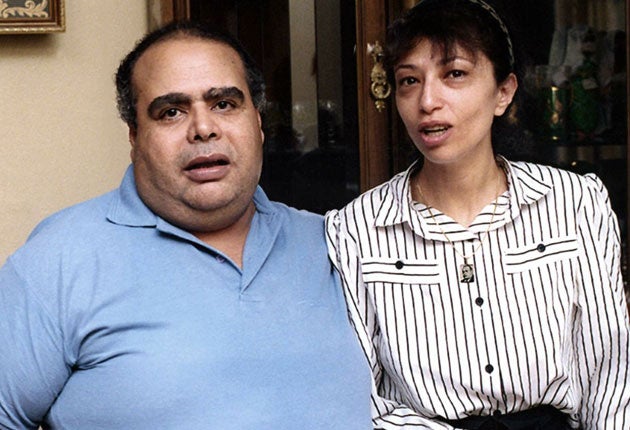Professor Nasr Hamed Abu Zaid: Modernist islamic philosopher who was forced into exile by fundamentalists

Your support helps us to tell the story
From reproductive rights to climate change to Big Tech, The Independent is on the ground when the story is developing. Whether it's investigating the financials of Elon Musk's pro-Trump PAC or producing our latest documentary, 'The A Word', which shines a light on the American women fighting for reproductive rights, we know how important it is to parse out the facts from the messaging.
At such a critical moment in US history, we need reporters on the ground. Your donation allows us to keep sending journalists to speak to both sides of the story.
The Independent is trusted by Americans across the entire political spectrum. And unlike many other quality news outlets, we choose not to lock Americans out of our reporting and analysis with paywalls. We believe quality journalism should be available to everyone, paid for by those who can afford it.
Your support makes all the difference.When The Independent interviewed Dr Nasr Hamed Abu Zaid, then professor of Islamic Philosophy at Cairo University, and his wife Dr Ibtihal Younis, a graduate of the Sorbonne who taught French Literature, they tried to put a brave face on their predicament. "When we lived in sin no one paid attention," joked Dr Younis. "Now we are respectably married, they [Muslim fundamentalists] want us divorced."
The couple had been targeted in a test case designed to sneak Sharia (the Islamic code) into Egypt's legal system, which is historically secular and based on French law. The applicants, a group of Islamist lawyers, unearthed a ninth-century court ruling known as Hessba which permits any group of at least three Muslims to seek injunctions or force action against people or an activity if they prove in court that they are acting to avert harm befalling Islam. Sharia, the plaintiffs argued, forbids Muslim women marrying non-Muslims since their children, who follow their father's faith in Egyptian traditions, would be born non-Muslims. Eventually the couple were forced to leave Egypt.
Nasr Hamed Abu Zaid was born in 1943 in Qahafa, 82 miles north of Cairo. His peasant family had no money for his schooling, but Vocational Studies grants enabled him to gain a communication diploma, and he got a job in 1960 with the country's Telecommunications Authority. He saved up for eight years to enrol at Cairo University to read Arabic and history. He graduated with honours and in 1972 became a fellow in the Islamic Studies Department, working overtime to finance his MA (1977) and PhD (1981) in Islamic Philosophy while learning English and German, which helped him as a visiting professor and on lecture tours.
Islamists initially targeted Abu Zaid because his seminars encouraged students to think beyond the rigid 13th century interpretation of texts considered by fundamentalists to be the ultimate authority on Islam. The Islamists' influence grew in the 1980s, and by the mid-1990s they were openly intimidating women into giving up the western fashions that had been the norm since the Europeanisation of Egypt's social and culture life by Ismail Pasha.
Traditionalists were shocked by Abu Zaid's philosophical analysis of the Quran in his books. His research into ancient texts was published in four volumes, whch challenged orthodox assumptions about the Quran's textual authority: The Philosophy of Hermeneutics, Critique of Islamic Discourse, Text, Authority and the Truth and Women in the Discourse of Crisis.
The fundamentalists' crusade against Abu Zaid was led by the head of Islamic Studies at Cairo University, Dr Abdul Sabour Chahine, who hand-picked a committee to evaluate the writings Abu Zaid had presented to support his candidacy for the University's professorship of Islamic Philosophy. It condemned his work as "blasphemous" and referred to him as "an infidel".
Chahine lost no time announcing the "verdict" to a 700- strong congregation during Friday prayer at a Cairo mosque controlled by radicals. This was dangerously provocative. The writer Farag Foda had been assassinated following condemnation of him during Friday prayer; and Naguib Mahfouz, the 1988 Noble laureate was stabbed in the neck by an Islamist who had heard his condemnation during a Friday lesson.
The persecution moved to new ground when a lawyer filed a lawsuit demanding that Abu Zaid and his wife divorce. In January 1994 the court rejected the demand because the plaintiff had no direct personal interest in the matter, but the Cairo Appeals Court accepted the argument that as a Muslim Dr Younis should not have married Abu Zaid.
The marriage was nullified, setting a precedent that allowed Islamists to form a Hessba each time they wanted to silence a secular intellectual. The film-maker Youssef Chahine and the acclaimed feminist Dr Nawal El Saadawi and her husband, the novelist Sherif Hetata, were among those dragged before the courts. Hundreds of mixed-faiths couples fled Egypt, where marriage between the faiths has been normal for generations.
The Abu Zaids settled in the Netherlands, where he became professor of Humanism and Islamic Studies at Utrecht University. "We are not only man and wife," Abu Zaid said. "She is a professor. She is an intellectual. She is not only a wife supporting a husband, she is a colleague supporting a friend."
Nasr Hamed Abu Zaid, philosopher and scholar: born Qahafa, Egypt 10 July 1943; married 1991 Ibtihal Younis; died Cairo 4 July 2010.
Join our commenting forum
Join thought-provoking conversations, follow other Independent readers and see their replies
Comments